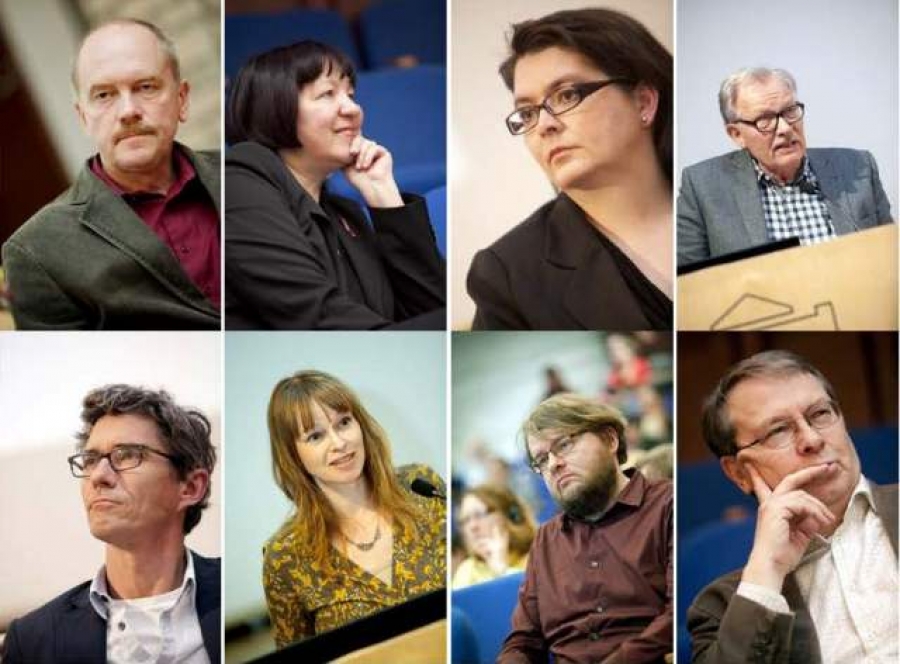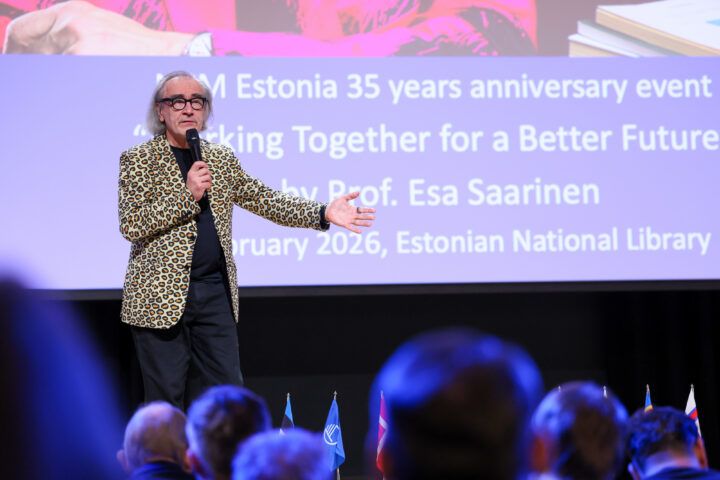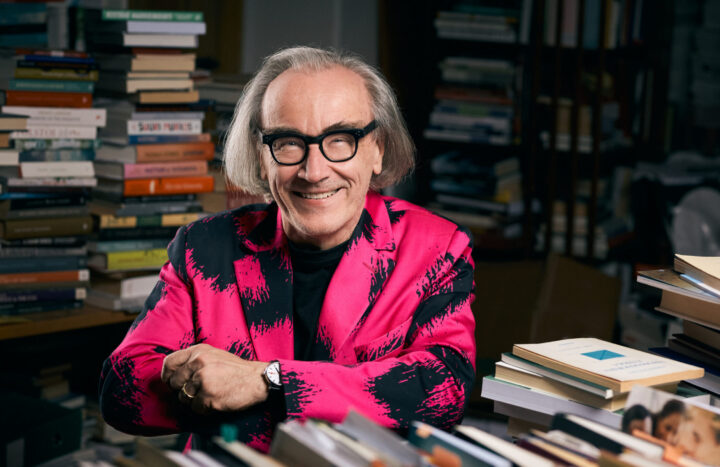2 questions: trends and viability of national literature in the Nordic-Baltic region

In order to get on averview of current trends and developments of national literature in the Nordic-Baltic region speakers at the first Nordic-Baltic literature forum “National Literature in the 21st Century: Insights and Perspectives” answered to 2 questions: 1. What are the latest trends and developments in literature in Estonia/Latvia/Lithuania/Finland/Sweden/Norway/Denmark/Iceland?; 2. How can we ensure the viability of national literature?
The interviews were published at the Estonian weekly culture magazine Sirp on April 19, 2013.
Katarina Gäddnäs (Åland Islands, Finland)
Writer and organiser of the Mariehamn Literature Days
- Unlike in Sweden, in Finland we still have fiction. I can’t claim to have much of an overview of the situation in Finland, since I’m from a Swedish-speaking environment, but I can say that Finnish Swedes at least still write traditional novels and that we have a lot of very strong writers – Monika Fagerholm, Kjell Westö, Robert Åsbacka, Kaj Korkea-Aho – who you’d swear are writing made-up stories. The fiction they write in Sweden is much more rooted in autobiography, by which I mean things that the authors themselves have experienced or are connected to.
- It’s important to start early and to really teach kids the basics of language, so that they learn to read, and read when they’re adults, and can tell the difference between good language and poor, colourless language. National literature isn’t a big issue for me. To me what’s important is that we’re living in a globalised world. People have a number of different identities these days. You can’t talk about one single Finland: there are several different Finlands, which is why I feel we need to hear everyone’s stories, and why they should be published and read.
Søren Vinterberg (Denmark)
Translator and Politiken newspaper critic
- I suppose you could say the move away from minimalism and the return to a broader range of story-telling is a new trend. There’s been 20 years of experimenting with minimalism and saying as much as you can in as few words as possible, but people are starting to tell more stories again about people’s everyday lives. Widening things, opening them up – they’re back on the agenda. To me that’s a good thing, because it means a broader audience is looking to read books. And I like that: it’s good for reading and it’s good for publishing.
Another trend is active use of new e-book formats by authors and writers. Some have already tried to create SMS narratives and short stories, and some have even had a go at publishing e-books in their garages, so to speak, and publishing their own books where there’s been demand for it. All of these formats are new. People are experiencing a lot of new things and I’m sure we’re on the verge of seeing things done that paper books have never been able to do. We’re talking about text that people read on their tablets where there’s animation accompanying the words. People are seeing pictures more cheaply than they ever have before. - First and foremost we need parents and politicians to be readers. That would ensure respect for reading and literature; respect for special skills – in this case the ability to express feelings. We’re sharing feelings, although that’s not something we realise until we read about it on paper or digitally. To know that we’re not alone in our feelings and our experiences, that we share them with everyone else, we have to hear or read the words. That’s why reading by its very nature is an antidote to loneliness and creates shared experiences, shared lives. To engender respect for that we have to know that our politicians are readers; they have to talk about the books they’re reading. We have to see parents talking about the things they’re reading, and see them actually reading them. That’s the best way we can go about ensuring the preservation of national literature.
There are political measures you can take, of course, lots of them, to encourage kids and adults to read and to spur authors on to write. This festival (the Tallinn Book Fair – Ed.) is one of them. Everyone here just reads and reads and reads! A big festival’s been organised every year in Denmark for the last 20 years, too, but only 5% of the population have been to a literary event in the past twelve months. There’s a lot of room for development yet where festivals are concerned.
There should be grants and prizes for good writers and really good writing. There should be support for translation of foreign literature. National literature alone is never enough if you want to be part of the world and to avoid individual solitude transforming into national solitude. You always need good international literature that’s translated into your mother tongue.
Liāna Langa (Latvia)
Poet, translator and editor of Latvju Teksti magazine
- We have to make sense of our history at a new intellectual level – what happened to us in the 20th century. A well-known author and public figure called Gundega Repše launched a writing project for historical novels which will see 10-12 authors penning stories over the next three years about different decades of the 20th century in Latvia. So we’ll get things about the 1960s and beat music and hippies, and the 1980s and the national awakening and perestroika. Of course, there’ll also be stories about Latvia’s first period of independence in the 1930s and about what happened under German and Soviet occupation in the 1940s.
Not that history’s the only thing on the agenda at the moment: intellectual poetry is very popular among young intellectuals. We have some really good, really interesting young poets – mostly students studying philosophy, philology, literature, that kind of thing.
We also have a very strong story-telling tradition, so a lot of new books get published, often merely as a hobby thing. There’s very little state support for writers – the most you can hope for if you’re writing a novel is $4000. That won’t even last you a year.
But we do have a lot of good books, and the strong story-telling tradition as I said, especially among women – Nora Ikstena, Kristine Ulberga, Gundega Repše and others.
We’ve entered something of a Renaissance era in Latvia in terms of children’s literature right now. A lot of authors and public figures are turning their attention to it. Inese Zandere, for example, is mostly writing for kids these days. Actions plans are also being drawn up to teach reading skills, reading’s being promoted and so on.
And of course, as elsewhere in the world the fantasy genre’s taking off. Some authors are writing in English so as to compete on the global market. Writing in Latvian is a mission, a patriotic act, with which you contribute to Latvian culture; to your country and your people. - Since we simply can’t survive in the current market conditions, we really do need major support from the state. It has to support Latvian literature – that’s the message we’re sending out. If it doesn’t, sooner or later it will simply disappear. People are already writing in English, and at the same time literature is becoming a bit superficial, although odd writers are still writing in Latvian.
We do have a lot of talented authors who deserve the state’s support. We’re not asking for anything special or anything extra – it’s a question of self-worth. It’s an investment in the future, and first and foremost in the future of Latvian as a language.
Johan Unenge (Sweden)
Writer, illustrator and Swedish Reading Ambassador 2011-2013
- Fewer factual books are being published that are being written in Sweden. That’s regrettable, since we’re pretty good at it, technically and financially. A very noticeable development is the publishing of very expensive works which are then translated into Swedish.
Another trend is the publication of children’s fiction in really long series. Publishing houses seem to think that there’s no sales platform for single volumes anymore, so it has to be book one of eight. Of course, that kind of approach has its advantages in terms of promoting reading. That way you’ll always find something with which to draw them back in if they’ve read and enjoyed the first book. That’s fantastic. But at the same time it’s very hard to keep track of all the series.
There’s an unprecedented amount of fantasy stuff. People are really starting to dig deep into mythology, too – it used to all be vampires and zombies, but now it’s angels and centaurs and all that.
Comics are shedding readers at a rate of knots. - Mass publication is good. Everyone can be a published author online. Writing and having others read what you’ve published can be a powerful experience and a real habit. It’s an important step in becoming a writer, that experience – that you’re not only writing stuff for yourself.
We need prizes, even if the Alma award is too big. Five million Swedish kroons is handed out to someone somewhere on the planet. No Swedish authors sit around pining for it. Perhaps the Nordic Council could step up here.
From the point of view of publishers the reputation of children’s books in Sweden is pretty good. Sure, it needs a little more space for development, slightly more professional assessment and the like. They don’t get much of a look-in – they might make it onto the same page as the album reviews in the run-up to Christmas.
We’re being taught how to write. People are writing more than ever before and a situation’s emerged where there are more authors than there are readers. People really do want to write. I guess the way we can ensure quality is through mass writing.
Laimantas Jonušys (Lithuania)
Translator and literary critic
- The rise of historical literature, and historical fiction, is a relatively new trend in Lithuania, although it’s been noticeable in some western countries for a number of years. We’ve always had a certain, smaller amount of historical fiction, but now some of our most outstanding authors have started focussing on it.
Essays have been coming along for the last ten years or so as well that in some way resemble fiction. I suppose you might call them ‘literary essays’ or ‘fiction essays’. They’ve become really popular, because writers can use them to showcase their own experiences. Mainly everyday life kind of things – stuff they’ve been through themselves, people they’ve met. Mostly in a slightly fiction-like take on things, since they’re recalling their impressions of things. It’s not factual writing. The writers are recording their feelings and their impressions, expressing themselves in a very literary way, often using complex language, and that by its very nature is part of fiction. These essays are part autobiographical and part fictional. - We need different things. One is readers’ attention – people have to read fiction. The way I see it, things are better now than they were 10 or 15 years ago. There’s more reader interest, and not just in translated literature but national literature, too. There was a sort of distrust before; only a handful of Lithuanian authors would ever make it onto the bestseller list. There are more of them now though, and public interest has risen.
I think the answer lies in the fact that national literature has become more diverse. It’s for all sorts of tastes. Authors are standing out from one another, so they’re more interesting to readers.
Of course, what we need is action plans to promote national literature to specific target groups. I think we’ll get them, too, because literary prizes – like the Booker in the UK and others – aren’t given out in Lithuania. There are a lot of books in Lithuania, although perhaps they’re just not exciting enough, or else they’re being promoted and showcased too little.
There are other ways you can involve readers though. For example, experts could choose a selection of books and ask readers to vote for their favourite. That way the readers would be motivated to read the books and make a choice. I think that would help promote national literature and get it out there to be seen.
Hrafn Andrés Harðarson (Iceland)
Poet, translator and director of Kópavogur library
- Crime novels and their authors have dominated in literature for quite a few years now. They’ve done really well in Iceland, they’ve been translated into German and English and they’ve been published in Germany, the UK, France and of course Scandinavia. A lot of good female writers have come to the fore as well, who are writing semi-and autobiographical stuff about their lives and their families. That kind of thing’s really popular at the moment.
- I think Icelandic literature’s really flourishing and that its prospects are good. The number of books published last year broke all records. People are now saying that publishing houses should reduce the number of books they’re releasing because the market’s too small and you just can’t support all of the books. Often that means financial losses, because there’s no demand for that many books.
Issues related to e-books are being talked about – how to deal with copyright problems and how to pay authors for books borrowed from libraries and such. For example, at the moment we can’t lend out e-books in libraries. A committee’s looking at the issue, but it’s all very complicated. The younger generation prefer e-books.
Silje Riise Næss (Norway)
Programme manager, House of Literature, Oslo
- Norwegian literature is all about autobiographies at the moment. I suppose you could say writing has always been driven by people’s personal experiences and what they see around them and how they perceive the world. In recent years that way of thinking has emerged even more. Largely that has to do with a literary phenomenon for which Karl Ove Knausgård is responsible – after writing two very successful and critically acclaimed books he set about penning a minutely detailed account of his life, from the day he was born right up to the present day and every thought he’s had in between, which weighed in at more than 3600 pages. Since then we’ve reassessed his previous fictional work and noticed that it was autobiographical as well.
But when a writer meets with that much success the critics write it off as passé and say that you can’t do that anymore. But there’s still huge interest in writing autobiographies. For example, one of our most interesting young writers of late, Kjersti Skomsvold, has written one in that style. - To start with, you have to read it. If people don’t read their national literature, it’s not alive. Then you have to talk about it. Knausgård is a good example here again. When I read his work, I felt like I was immersed in the spirit of that time, that he was writing about my life. Reading it I realised that he was writing about our generation and about how we perceive things. But other people read his stuff as well – my mother, for one, and 80-year-old women, and men in their 20s. None of them are 44 years old yet, or anymore, but they all get something out of his writing.
I think this tells us something very fundamental about literature: that good writing is universal, and that in getting people to talk about their experiences literature becomes stronger.
Jan Kaus (Estonia)
Writer, translator and critic
- The issue of writing skills is becoming more and more topical. Finnish author Jari Tervo says people wrongly assume that if you know how to read, you automatically know how to write. That in turn raises the question of whether trends and developments in writing culture shouldn’t be influenced from the point of view of writing skills. To me the position of fiction and the present and future of editing culture are becoming more and more important. I don’t think of editors as miracle workers, but when it comes to shaping key literary works we need to turn more attention to the role of educated, critical, well-read editors who have a good sense of language. Particularly because the importance of what editors do is often inversely proportional to how much recognition it receives. The Ministry of Culture or the Cultural Endowment (or both) could introduce stipends or awards for editors that would shine more of the limelight on the role they play and perhaps motivate some people who read and have a decent feel for language.
I guess in a situation where there is ever more literature being published and the wheat isn’t being sorted from the chaff, the role of critics is becoming far more central. I’m reading Marc Augé’s Non-Places at the moment (TLÜ Kirjastus, 2012, translated into Estonian by Anti Saar), where he writes: “A space that cannot be defined by its identity, relationships or history is a non-place.” A critic’s attitude to the writing sphere can be much the same – something like “A text that cannot be defined by its idiosyncrasies or use of language or by the mentality behind it is non-literature.” And again, we have a prize for longer articles that appear in professional magazines, but maybe we need one for reviews, too.
I’m pleased to see that there’s a subtle but consistent shift taking place that’s making translated literature equal to and a natural part of Estonian-language writing culture. - More than anything we need state support, which doesn’t only or primarily have to be financial, but sometimes simply mental. It’s not merely an issue of a ministry that’s looming over libraries and is fixed in tendencies that the facts struggle to support. It’s about the funding of culture generally, the decline in which seems almost unstoppable – the ministry’s budget might increase, but attitudes are borne out on a broader scale, in the overall budget. And although it’s probably saying it for the thousandth time, the social effect of culture is not direct or measurable in money, because shaping people’s language skills, how they understand the world, their symbolic thinking, their empathy, their curiosity and their sense of humour – or if not shaping them, then returning them to these things – is a slow process. The attitude we’re seeing again and again in politics these days can be summed up as “If you’re not with us, you’re not important and you’re not useful”. But education and culture inspire a different kind of world view, where diversity doesn’t only “enrich”, but is inescapable and indeed vital. Educational and creative ideals find their own kind of harmony in how important each individual is. Whereas in politics today there’s too much insistence on divide and conquer, the intellectual sphere – writers included – needs to hold on to the other meaning of the word: ‘dividing’ as in ‘sharing’, not ‘separating’. That might all sound a bit overblown, but we’ve got to stand up against the proliferation of indifference from above and apathy from below.
The first Nordic-Baltic “National Literature in the 21st Century: Insights and Perspectives” forum was held as part of the Tallinn Book Fair and Baltic Book Fair at the Estonian National Library on 5 April 2013. The Nordic Council of Ministers’ Offices in Estonia, Latvia and Lithuania launched the project, which grew out of the concept of Nordic Library Week. The objective was to create a platform for discussions about the vitality of modern literature and the status of libraries in society.
Find out more about the forum here.
Talking to the presenters at the “National literature in the 21st century: insights and perspectives” Nordic-Baltic literature forum were Triin Oppi and Theresé Svedberg from the Nordic Council of Ministers’ Office in Estonia.


